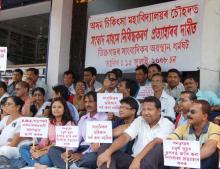On 23 January 2009, the Group of Ministers (GoM) in India will again meet to assuage concerns of tobacco lobby on pictorial warnings, health activists apprehend.
This group of ministers (GoM) consists of: Pranab Mukherjee (External Affairs Minister), Kamal Nath (Commerce and Industry Minister), Priyaranjan Dasmunsi (former Information and Broadcasting Minister), S Jaipal Reddy (Urban Development Minister), Dr Anbumani Ramadoss (Health and family welfare Minister), and Oscar Fernandes (labour and employment Minister for state).
The pictorial warnings on tobacco products are proven to reduce tobacco consumption. Particularly in countries like India, where literacy rates are alarmingly low, it is vital to implement the pictorial warnings on tobacco products stringently without delay.
Pictorial health warnings on tobacco products were supposed to be implemented on all tobacco products from November 30, 2008 after being deferred and diluted several times since the first notification which came in July 2006. However, the GoM met again and further delayed the implementation of pictorial warnings to May 31, 2009.
"It is a matter of great disappointment that every time the GoM meet, the decision on implementation of pictorial warnings on tobacco products gets either delayed or diluted. The GoM has repeatedly put aside the critical health concerns of millions of Indian citizens. It seems that the people's representatives of the largest democracy in the world are more interested to boost the health and profits of the tobacco industry, particularly the bidi sector" said Alok Mukhopadhyay, Chief Executive, Voluntary Health Association of India (VHAI).
The timing of the meeting on the eve of election announcement and the purpose of the meeting are feared to once again derail the already diluted pictorial warnings on tobacco products.
The GoM is apparently concerned about the global economic meltdown, giving unfounded arguments that the tobacco industry will be hard hit by it. However, the Prime Minister of India, a veteran economist and the former Finance Minister Mr. P Chidambaram have given statements time and again that the Indian economy is least affected by the global economic crisis. The tobacco major ITC has reported more than expected net growth in profit for the third quarter which ended in December 2008. Net sales during this period grew 11%, which was driven by the sales increase in stationary products and cigarettes.
"2500 people die every day due to tobacco related diseases in India, with about 10 lakhs people deaths attributed to tobacco use every year in India" said Professor (Dr) Rama Kant, who heads the Tobacco Cessation Clinic at CSM Medical University and was awarded by the World Health Organization's Director General in 2005 for his contribution to tobacco control.
Whereas, the cost to the government in treating tobacco related diseases is exorbitantly high. Economic costs related to treatment of tobacco related ailments are 16% higher than annual tax generated from tobacco. A recent paper on Economic Cost of Tobacco Use in India, 2004 reveals that the "direct medical costs of treating tobacco related diseases in India amounted to Rs.4125 crore for smoked tobacco and Rs. 1296 crore for smokeless tobacco. The indirect morbidity costs of tobacco use, which includes the cost of caregivers and value of work loss due to illness, amounted to Rs. 1810 crore for smoked tobacco and Rs. 473 crore for smokeless tobacco. The total economic cost of tobacco use amounted to Rs 7731 crore."
"Recession is no excuse for the current government to back off on protecting and promoting public health. India has been least hit by the current global economic crisis, no where in the world did any government compromise the health of its citizens due to these economic crisis as has been done by the India government" said Monika Arora, Director, HRIDAY (www.hriday-shan.org).
In the case of pictorial warnings, India also has time bound international mandate under Framework Convention on Tobacco Control (Article 11) requiring display of pictorial warnings on all tobacco products, besides, Cigarettes and Other Tobacco Products (Prohibition of Advertisement and Regulation of Trade and Commerce, Production, Supply and Distribution) Act, 2003 (COTPA) under section 7 echoes the same principles. It is ironical that the very same Government that has vehemently supported the guidelines on Article 11 of the FCTC (pack warnings) for the global community at the Conference of Parties in November 2008 at Durban, South Africa has backtracked on the same at its home ground. The Government in deferring the pack warnings has not only dishonoured its international commitment but also undermined the health of its 1 billion citizens.
"The rehabilitation of Bidi Industry workers in an alternative vocation along with its phasing out should be prioritized. We consider that is the only way forward to eliminate their misery, ill-health and exploitation by all direct and indirect beneficiaries of this highly unregulated industry blatantly flouting laws, in particular those related to Women and Child welfare. The Political Leadership can make the difference, but only if it decides to do so" said Dr Rakesh Gupta, Honorary Chairman, Rajasthan Cancer Foundation.
Advocacy Forum for Tobacco Control (AFTC) is a coalition of 51 pan Indian organizations (from 23 states and 1 Union Territory of India), working in the area of advocacy, awareness promotion and research related to tobacco control in India.
AFTC members demanded that the GoM meeting should not weaken, dilute or delay the pictorial warnings on tobacco products provision by any means and give precedence to health over profits.
Bobby Ramakant
- The author is a World Health Organization (WHO)'s WNTD Awardee (2008) and can be contacted at: bobbyramakant@yahoo.com





Add new comment